- Home
- Alison Weir
Katheryn Howard, the Scandalous Queen
Katheryn Howard, the Scandalous Queen Read online
Katheryn Howard, The Scandalous Queen is a work of historical fiction, using well-known historical and public figures. All incidents and dialogue are products of the author’s imagination and are not to be construed as real. Where real-life historical or public figures appear, the situations, incidents, and dialogues concerning those persons are entirely fictional and are not intended to change the entirely fictional nature of the work. In all other respects, any resemblance to persons living or dead is entirely coincidental.
Copyright © 2020 by Alison Weir
All rights reserved.
Published in the United States by Ballantine Books, an imprint of Random House, a division of Penguin Random House LLC, New York.
BALLANTINE and the HOUSE colophon are registered trademarks of Penguin Random House LLC.
LIBRARY OF CONGRESS CATALOGING-IN-PUBLICATION DATA
Names: Weir, Alison, author.
Title: Katheryn Howard, the scandalous queen: a novel / Alison Weir.
Description: New York: Ballantine Books, [2020] | Series: Six Tudor queens; 5
Identifiers: LCCN 2019059062 (print) | LCCN 2019059063 (ebook) | ISBN 9781101966600 (hardcover; acid-free paper) | ISBN 9781101966617 (ebook)
Subjects: LCSH: Catherine Howard, Queen, consort of Henry VIII, King of England, –1542 | Queens—Great Britain—Fiction. | England—Court and courtiers—History—16th century—Fiction. | Great Britain—History—Henry VIII, 1509–1547—Fiction. | GSAFD: Biographical fiction. | Historical fiction.
Classification: LCC PR6123.E36 K39 2020 (print) | LCC PR6123.E36 (ebook) | DDC 823/.92—dc23
LC record available at https://lccn.loc.gov/2019059062
LC ebook record available at https://lccn.loc.gov/2019059063
Ebook ISBN 9781101966617
randomhousebooks.com
Book design by Chris Zucker, adapted for ebook
Cover design: Victoria Allen
Cover photograph: Richard Jenkins
ep_prh_5.5.0_c0_r1
Contents
Cover
Title Page
Copyright
Epigraph
Genealogy
Part One: “Flourishing in Youth with Beauty Fresh and Pure”
Chapter 1
Chapter 2
Chapter 3
Chapter 4
Chapter 5
Chapter 6
Chapter 7
Chapter 8
Chapter 9
Chapter 10
Chapter 11
Chapter 12
Part Two: “So Highly Beloved, Far, Far Beyond the Rest”
Chapter 13
Chapter 14
Chapter 15
Chapter 16
Chapter 17
Chapter 18
Chapter 19
Part Three: “To Be a Queen, Fortune Did Me Prefer”
Chapter 20
Chapter 21
Chapter 22
Chapter 23
Part Four: “Breaking the Fetters of Fame and Chastity”
Chapter 24
Chapter 25
Chapter 26
Chapter 27
Chapter 28
Part Five: “How Dreadful Is the Jewel of Brittle Beauty”
Chapter 29
Chapter 30
Chapter 31
Chapter 32
Chapter 33
Chapter 34
Author’s Note
Dedication
By Alison Weir
About the Author
Thus, as I sat, the tears within my eyen,
Of her the wreck whiles I did debate,
Before my face me thought I saw this Queen,
No whit as I her left, God wot, of late
But all bewept, in black and poor estate,
Which prayed me that I would ne forget
The fall of her within my book to set.
—GEORGE CAVENDISH, METRICAL VISIONS
1528
Katheryn was seven when her mother died. She would never forget being led by her nurse into the dim, musty bedchamber where Father was kneeling beside the bed, his head in his hands and his shoulders heaving, and the chaplain was saying prayers. It was shocking having to kiss the cold forehead of the still figure lying in the bed, which looked so unlike the mother she knew.
Why had she died? She had been up and about only yesterday. Yet she had heard her mother screaming in the night, and somehow knew that the little stranger lying in the next room had something to do with it.
“You must be brave,” her half-sister Isabel murmured. “Our lady mother is now in Heaven, watching over you.” It was hard to understand that when Mother was clearly lying here.
When Katheryn started wailing, Isabel took her hand and led her out.
“Hush, sweeting,” she said, sounding choked herself. “Let us go and see our new sister.”
Katheryn stared down at the snuffling infant lying in the cradle. Mary had plump pink cheeks and a pouting mouth. She was tightly swaddled and wore a close-fitting bonnet. It would be ages before she was old enough to play with Katheryn.
“You must be a mother to her now,” Isabel said. Katheryn wasn’t sure about that. Babies held little appeal for her; they didn’t do anything. She would far rather be romping with her brothers, Charles, Henry, and George, even though they were much older and did not always want to be encumbered by a needy little girl.
She had even older brothers and sisters, too, Mother’s children by her first husband. In the days after Mother died, they came down from Stockwell to pay their respects, headed by John Leigh, Katheryn’s eldest half-brother, whom she adored. All the Leighs doted on her, especially Isabel. Isabel was lovely: tall, very fair, and still pretty, even though she was thirty-two, which seemed ancient. She was being very kind to Katheryn and had offered to stay on to help Father. It was a mercy that Isabel had been at Lady Hall when Mother died, for Father had now disappeared behind his chamber door, being too sunk in his own grief to heed his children’s misery. It was Isabel who clutched Katheryn to her flat velvet bosom, dried her tears, and came hastening when she woke screaming from a nightmare. Isabel had come to help with the new baby. Katheryn thought Isabel should have babies of her own, since she loved them so much, but Isabel was not yet married.
Katheryn was not now interested in practicalities. All she knew was that Mother was gone and that her world had been shattered. She understood what death was, for the household chaplain had explained that it was like going to sleep, although you never woke up because you had gone to Heaven to be with God, and that was something to rejoice over. But no one seemed to be rejoicing at all, and Katheryn thought that God was very selfish, taking her mother away when she loved her so much.
There came the day when Katheryn was kneeling on the floor of the hall, playing shovelboard with Isabel as her nurse looked on, and Father summoned her to his private closet with its dark paneled walls. To the child, Lord Edmund looked wild-eyed and haggard in the candlelight.
“Come here, Kitty,” he said. It was his pet name for her. “I have something for you.” He held out his hand and there in his palm lay a glittering ruby ring. “Your mother left
it to you,” he went on. “She wanted you to have it. You must take great care of it.”
Katheryn picked it up, gazing at it in wonderment. She had never owned such a beautiful object; indeed, she owned barely anything at all, save for her clothes and a few playthings. They were poor; she had grown up knowing it, just as it had been drummed into her that, despite their poverty, she was a Howard and a member of one of the greatest and most noble families in England. The Duke of Norfolk himself was her uncle.
The ring gleamed at her, then its image blurred as tears welled at the memory of her mother wearing it. She would treasure it; it was all she had left of her.
“Give it to Isabel to keep safely for you until you are older,” Father said. “You will be going away soon; this house is no place for children.”
“Going away? Where, Father?” Katheryn asked, alarmed. She did not want to leave Lady Hall.
“Your Aunt Margaret Cotton has gladly agreed to take you. Your brothers will go to the Duke to be trained for knighthood, and Mary will live with her wet nurse in the village. You will leave for Oxon Hoath on Monday.” Monday was just three days hence.
The tears spilled over. “Are you coming, too?” Katheryn whispered.
Lord Edmund laid his hand on her head and sighed. “No, Kitty. Isabel will go with you. I have to stay here and attend to my affairs. God only knows what the future holds, for there is no money left. Be grateful that your aunt is a woman of true Christian charity and is willing to look after you.”
Katheryn did not think she had ever met Aunt Margaret Cotton, and did not wish to do so now. “I want to stay here with you,” she said.
“Alas, Kitty, I am not fitted to rearing children,” Father said. “It is better you grow up in comfort than starve with me.”
“Are you going to starve?” Katheryn asked.
“Well, probably not,” her father said. “But I cannot give you the life you deserve, and Aunt Margaret can.”
Katheryn cried again at that. She had not dreamed that losing Mother would mean losing Father as well. He had never loomed large in her life, yet he was part of that familiar world that was now crumbling. He patted her head again and called for Isabel. It was she who comforted the child, shaking her head in sorrow at the nurse.
* * *
—
Katheryn sat in the litter, wrapped in blankets against the November chill, with Isabel beside her. She was sunk in misery as she watched her father waving farewell and Lady Hall vanishing in the distance, and craned her head through the window for a last glimpse of it, until Isabel told her to sit back and pulled down the blind.
“It’s freezing, sweeting,” she said.
Katheryn sat there trying to remember her mother’s face. It was horrible knowing that she would never see it again. She might never again play with her boisterous brothers in the field that lay between Lady Hall and the church at Moreton. Her head was full of memories: the Christmas gatherings at Lambeth, receiving a cloth doll made by Mother at New Year, getting her brothers to carry her pig-a-back and Father reprimanding them for being too rough with her, and her nurse grumbling because there was no money for new clothes. But her most cherished memories were those of her mother. Mother sewing by the fire, or making cordial in the still room, Mother teaching her how to make daisy chains, Mother kissing her good night, her gentle hand stroking her hair. Tears welled.
“You’ve not met your Culpeper kinsfolk, have you, sweeting?” Isabel said. “They are my family, too. Our mother was a Culpeper before she married. Aunt Margaret is her sister. You will come to love her, I am sure.”
They jolted through Epping Forest, passing through the villages of Chipping Ongar and Kelvedon Hatch. Presently, Katheryn fell asleep, and only woke up when Isabel shook her shoulder at Tilbury. Here they were to catch the ferry across the Thames to Gravesend. Down by the jetty there was a man selling hot pies, and Isabel bought three, one each for her and Katheryn and one for the groom, and some hot spiced ale.
It was a short journey by boat to the Kent coast. Isabel folded Katheryn in her cloak as they stood on deck and watched Gravesend looming near.
“Is it far to Oxon Hoath?” Katheryn asked as the vessel rocked on the tide.
“About sixteen miles. We’ll break our journey and stay overnight at Meopham. That’s about five miles from Gravesend.”
But they found nowhere suitable to stay at Meopham and had to ride on a further six miles until they arrived, exhausted, at the Bull Inn at Wrotham, which looked inviting. Isabel paid for a private chamber and asked for food to be brought up to them. They had the daily ordinary, a bowl of rich beef stew and slices of apple pie. Then Isabel put Katheryn to bed and sat sewing in a chair by the fire. It all seemed so strange, after the known and the familiar, and Katheryn started crying into her pillow. Instantly, Isabel was there, holding her in her arms.
“I know, I know, sweeting. She was my mother, too, and I miss her dreadfully.” Clutching each other, they wept together until Katheryn fell asleep.
* * *
—
Aunt Margaret Cotton was waiting for them at the door of a big old house with uneven walls and stout timbers. She was a plump matron in her forties with ruddy cheeks and a brisk manner, but Katheryn could see warmth and sympathy in her eyes.
“Oh, the poor mite!” she pronounced. “I’m glad you brought her to me, Isabel.”
“So am I, dear aunt,” said Isabel, and the women embraced each other.
“William!” Aunt Margaret called, and a kindly looking man appeared. He greeted Isabel with a kiss and patted Katheryn’s head.
“You’re a pretty little thing,” he told her. “I hope we’re going to be friends.” Katheryn ventured a tentative smile.
“Come in the warm, child,” Aunt Margaret instructed. “Let’s get some decent food into you.” In the hall, she stood back and appraised Katheryn. “I can see you’re my sister Joyce’s child; you look just like her, dear, apart from your hair. That auburn hair comes from the Howards. Joyce was fair, like me.” She dabbed her eyes with a kerchief. “I can’t believe she’s gone. I hope he had her buried decently!”
Katheryn saw Isabel frown at Aunt Margaret. “Of course he did,” she said. “She’s at Lambeth, in the Howard chapel.”
That seemed to satisfy Aunt Margaret. “Now, Katheryn,” she said, “you shall meet your cousins.” She led them into a parlor where four children in her very image were sitting at a table. They all rose and bowed or curtseyed as their mother introduced them. “This is Thomas, he’s eight, and John, who is seven. Joan’s our eldest; she’s fourteen, and Anne is twelve. Joan and Anne are both to be wed soon. We shall miss them when they leave the manor.”
The children all seemed friendly. Thomas was a mite shy at first, but Katheryn thought he might be interesting and kind when you got to know him, whereas John had a mischievous look about him, and would not sit still, to his parents’ exasperation. The girls were sweet things and made much of Katheryn, who was eager to point out that she had brothers, too, and loved to play games with them.
“Do you play catch and ninepins?” John asked.
“I can play anything!” Katheryn boasted.
“So can I!” he countered.
The adults left them to it and went off to unpack Katheryn’s things. Anne suggested a game of hide-and-seek and pulled Katheryn along with her to show her the many hiding places the old house afforded.
“It’s an ancient place,” she told her. “It’s two hundred years old!”
There were lots of corners and crannies within the numerous stairs and chambers, and cupboards and closets galore; soon Katheryn was racing about and shrieking with the rest. By the time they were called to dinner in the parlor, she was feeling a lot happier.
Within a week, she felt quite at home at Oxon Hoath, where everyone was so kind to her. She could see in Aunt Marg
aret comforting resemblances to her mother, and Uncle William was a very merry fellow who had an endless store of jokes. There was a litter of kittens in the barn, and a host of dogs about the place. Above all, she was struck by how well the Cottons lived, what good food they had, and their fine clothes. She had never known such plenty at Lady Hall or at her father’s town house in Lambeth. She felt drawn into the bosom of the Cotton family, who treated her as one of their own. Only at night did she weep for her mother.
The young Cottons enjoyed a lot of freedom and the run of the house and its surrounds. It stood in the middle of a great deer park and had been in the Culpeper family for generations. There were lots of Culpeper relations living nearby, at places called Bedgebury, Wakehurst, and Preston Hall, many of whom came visiting while Katheryn was at Oxon Hoath. Later, she learned that her grandfather had been the last of his particular line, and that his estates had been divided between his two daughters, her mother, Joyce, and Aunt Margaret. How different life might have been if Mother had inherited Oxon Hoath!
One day, as Margaret and Isabel were overseeing the boiling of plum puddings for Christmas, Katheryn was sitting under the kitchen table, playing with a kitten and listening to her elders conversing. Much of what they said went over her head, but her ears pricked up at one point.
“You did better for yourself than Mother,” Isabel said. “She married the son of a duke, but you’ve had the happier life.”
“Aye,” Aunt Margaret agreed. “I still have the house and much of the property left me by your grandfather. Edmund squandered all Joyce’s inheritance on his extravagances and gambled the rest away at cards. Now there is nothing left but what the Howards have given him. I daresay he’d wager the very roof over his head if he thought it could bring him a fortune. And him an educated man, who has learned Latin, French, and logic and God knows what else. He ought to know better!”

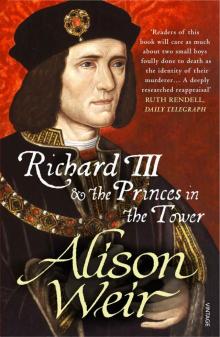 Richard III and the Princes in the Tower
Richard III and the Princes in the Tower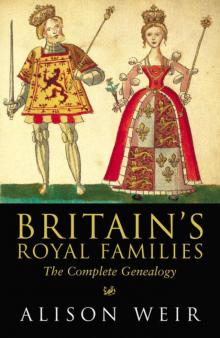 Britain's Royal Families: The Complete Genealogy
Britain's Royal Families: The Complete Genealogy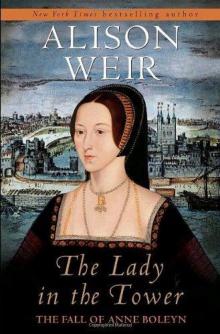 The Lady in the Tower: The Fall of Anne Boleyn
The Lady in the Tower: The Fall of Anne Boleyn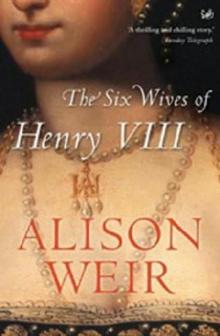 Six Wives of Henry VIII
Six Wives of Henry VIII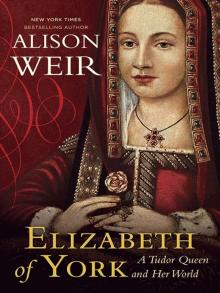 Elizabeth of York: A Tudor Queen and Her World
Elizabeth of York: A Tudor Queen and Her World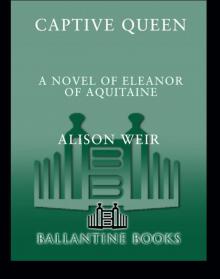 Captive Queen
Captive Queen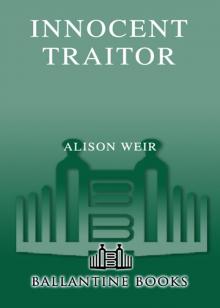 Innocent Traitor
Innocent Traitor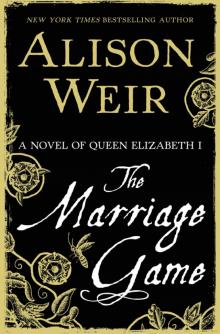 The Marriage Game
The Marriage Game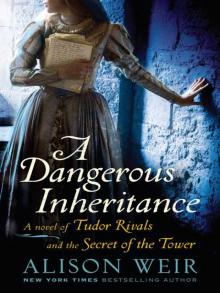 A Dangerous Inheritance
A Dangerous Inheritance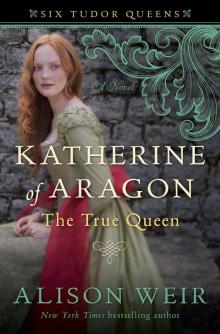 Katherine of Aragón: The True Queen
Katherine of Aragón: The True Queen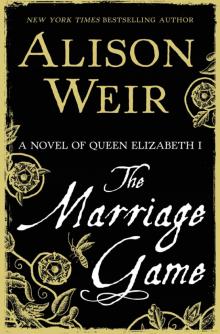 The Marriage Game: A Novel of Queen Elizabeth I
The Marriage Game: A Novel of Queen Elizabeth I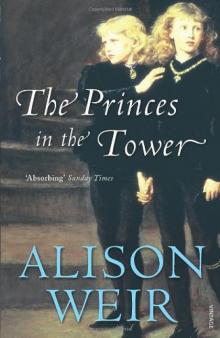 Princes in the Tower
Princes in the Tower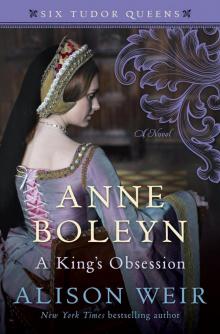 Anne Boleyn: A King's Obsession
Anne Boleyn: A King's Obsession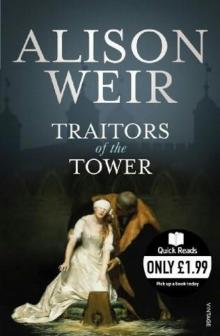 Traitors of the Tower
Traitors of the Tower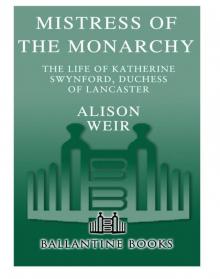 Mistress of the Monarchy: The Life of Katherine Swynford, Duchess of Lancaster
Mistress of the Monarchy: The Life of Katherine Swynford, Duchess of Lancaster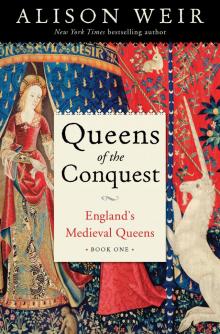 Queens of the Conquest: England’s Medieval Queens
Queens of the Conquest: England’s Medieval Queens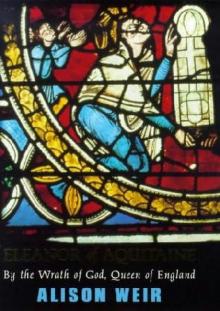 Eleanor of Aquitaine: A Life
Eleanor of Aquitaine: A Life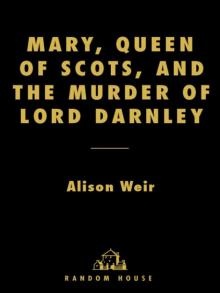 Mary, Queen of Scots, and the Murder of Lord Darnley
Mary, Queen of Scots, and the Murder of Lord Darnley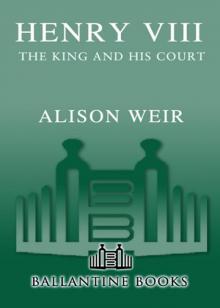 Henry VIII: The King and His Court
Henry VIII: The King and His Court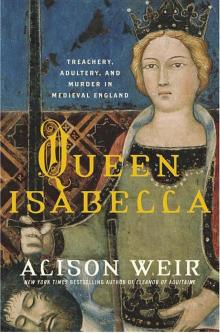 Queen Isabella: Treachery, Adultery, and Murder in Medieval England
Queen Isabella: Treachery, Adultery, and Murder in Medieval England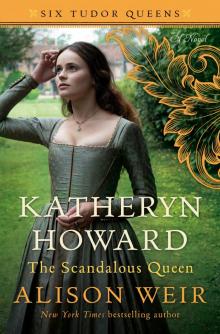 Katheryn Howard, the Scandalous Queen
Katheryn Howard, the Scandalous Queen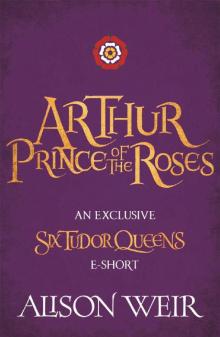 Arthur- Prince of the Roses
Arthur- Prince of the Roses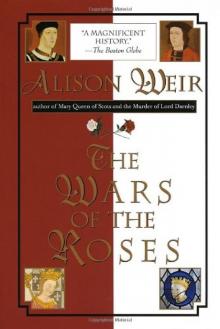 The Wars of the Roses
The Wars of the Roses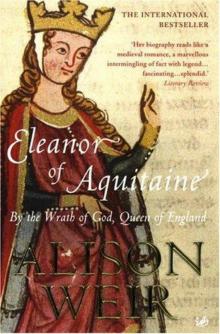 Eleanor of Aquitaine: By the Wrath of God, Queen of England
Eleanor of Aquitaine: By the Wrath of God, Queen of England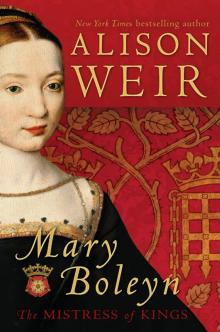 Mary Boleyn: The Great and Infamous Whore
Mary Boleyn: The Great and Infamous Whore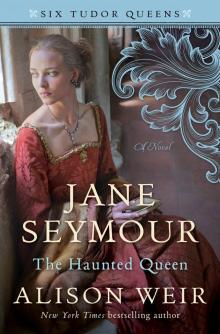 Jane Seymour: The Haunted Queen
Jane Seymour: The Haunted Queen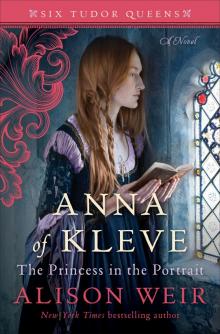 Anna of Kleve, the Princess in the Portrait
Anna of Kleve, the Princess in the Portrait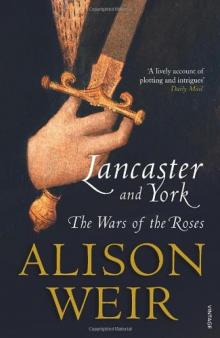 Lancaster and York: The Wars of the Roses
Lancaster and York: The Wars of the Roses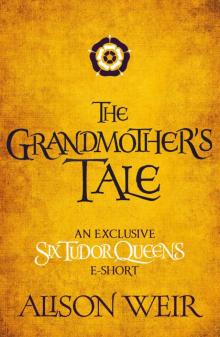 The Grandmother's Tale
The Grandmother's Tale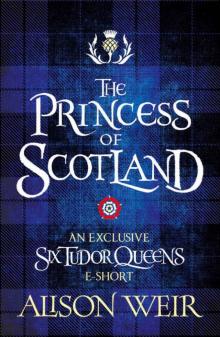 The Princess of Scotland (Six Tudor Queens #5.5)
The Princess of Scotland (Six Tudor Queens #5.5)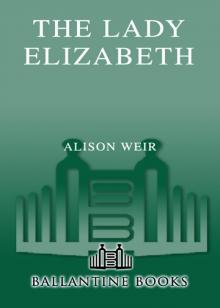 The Lady Elizabeth
The Lady Elizabeth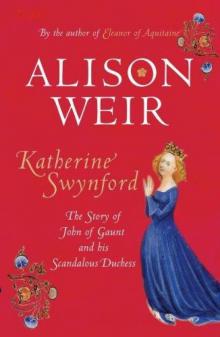 Katherine Swynford: The Story of John of Gaunt and His Scandalous Duchess
Katherine Swynford: The Story of John of Gaunt and His Scandalous Duchess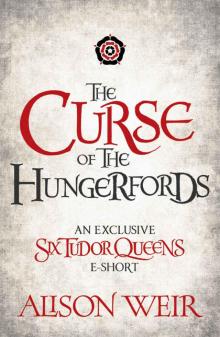 The Curse of the Hungerfords
The Curse of the Hungerfords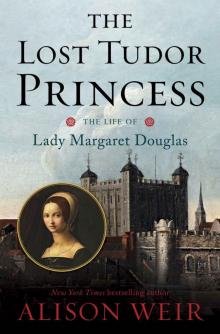 The Lost Tudor Princess: The Life of Lady Margaret Douglas
The Lost Tudor Princess: The Life of Lady Margaret Douglas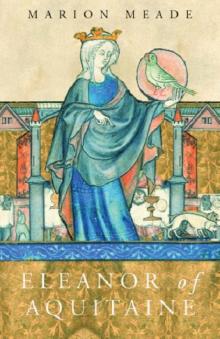 Eleanor of Aquitaine
Eleanor of Aquitaine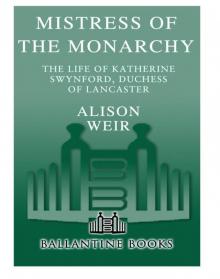 Mistress of the Monarchy
Mistress of the Monarchy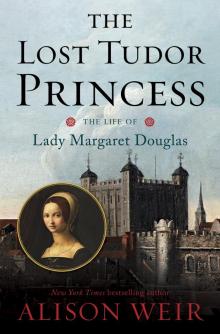 The Lost Tudor Princess
The Lost Tudor Princess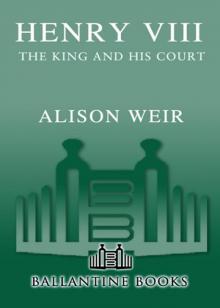 Henry VIII
Henry VIII Anne Boleyn, a King's Obsession
Anne Boleyn, a King's Obsession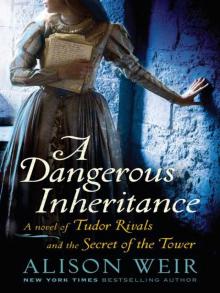 A Dangerous Inheritance: A Novel of Tudor Rivals and the Secret of the Tower
A Dangerous Inheritance: A Novel of Tudor Rivals and the Secret of the Tower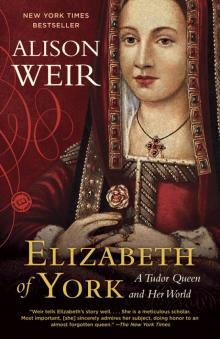 Elizabeth of York
Elizabeth of York Katherine of Aragon, the True Queen
Katherine of Aragon, the True Queen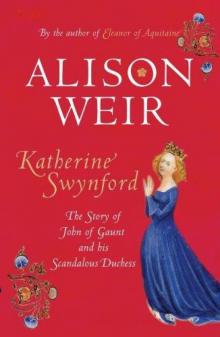 Katherine Swynford
Katherine Swynford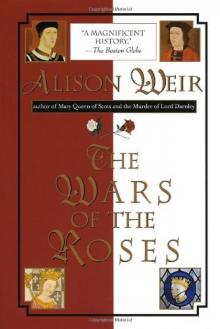 Wars of the Roses
Wars of the Roses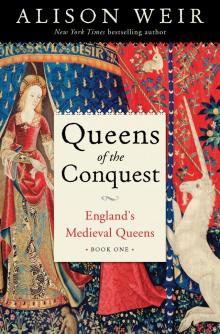 Queens of the Conquest
Queens of the Conquest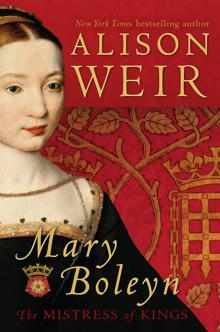 Mary Boleyn
Mary Boleyn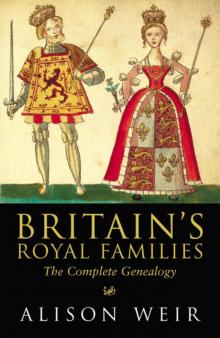 Britain's Royal Families
Britain's Royal Families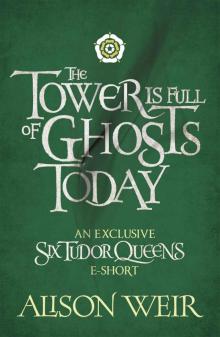 The Tower Is Full of Ghosts Today
The Tower Is Full of Ghosts Today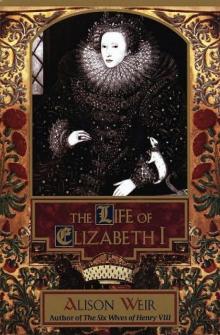 Life of Elizabeth I
Life of Elizabeth I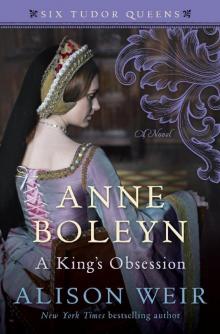 Anne Boleyn A King's Obssession
Anne Boleyn A King's Obssession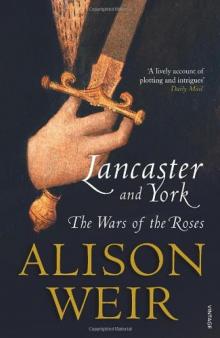 Lancaster and York
Lancaster and York Jane Seymour, the Haunted Queen
Jane Seymour, the Haunted Queen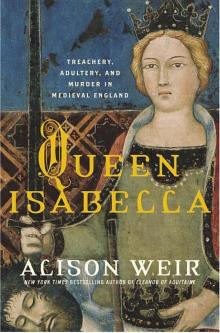 Queen Isabella
Queen Isabella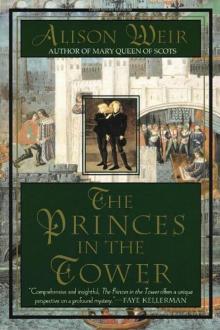 The princes in the tower
The princes in the tower